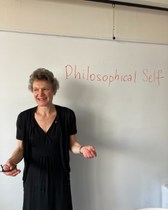Inessa Medzhibovskaya
New School for Social Research

Inessa Medzhibovskaya is Professor of Literary and Liberal Studies with a joint appointment at Eugene Lang College and The New School for Social Research in New York City. With training in philology, intellectual history, Germanic, and Slavic Studies, and international education, she is interested in how literature and philosophy transmit human values in their cultural and historical specificity and universality. She regularly teaches on Russian, German and European classics, Shakespeare, Schopenhauer, the theatre masters Bertolt Brecht and Erwin Piscator; single-text courses on Anna Karenina, Faust, Hamlet, War and Peace; and problem-oriented courses on such topics as “Bildungsroman,” "Romanticism," “crime and salvation,” “writing and confinement,” “the anxiety of possession,” “love and its genres,” “laughter and politics,” “labor and dignity,” "the life of the mind," “philosophical selfhood,” "radical aesthetics," “modernist identity,” and “exile.” She was named a distinguished teacher in 2007.
Medzhibovskaya is the author of Tolstoy and the Religious Culture of His Time (2008; paperback 2009), the first definitive biography of Tolstoy’s religious and philosophical evolution and edited several volumes addressed to his art and thought in relation to the historical milieu that shaped his problems and eternal quests. Her second monograph. Tolstoy's On Life (from the Archival History of Russian Philosophy (2019), is the story of the struggle of Russian thought for self-definition. She has published prolifically on literature (focusing mainly on Russian and European authors and thinkers), ideology and education, and the interplay of philosophy, religion, politics and literary aesthetics. Her book-sized online bibliography of Tolstoy’s publications and Tolstoy criticism in the Oxford University Press Bibliographies series appeared in 2021. She is the editor of the critical edition of Tolstoy’s On Life, co-translated with Michael Denner (2018), and editor of two more volumes: Tolstoy and His Problems: Views from the Twenty-First Century (2018), and A Critical Guide to Tolstoy’s On Life: Interpretive Essays (2019). She also served as the academic advisor for volumes 267 and 289AC of Short Story Criticism from Gale/Cengage (2019, 2020). Her new volume Tolstoy as Philosopher is about to be published in September, 2022. In addition to a new monograph, a historical-archival documentary of the twentieth century for Princeton University Press, she is returning to a reappraisal of the Hegelian-Marxist legacy dating back to the foundation of her academic career as a literary and intellectual historian.
View Articles:
Russian Classics on Trial: Reflections on Critics and Criticism
